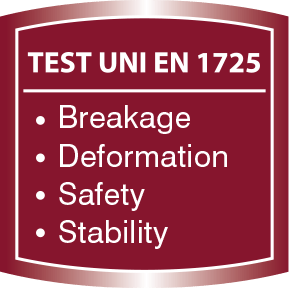

suitable bed bases and supports
All bed bases on the market are said to be quality products by their manufacturers. In fact, any bed base must meet well-defined requirements and characteristics in order to be defined as such. Specific lab tests are used to objectively determine if this is the
case.
The technical standards regulating the tests designed for bed bases and sommier beds are divided into three types, i.e. performance tests, dimensional tests and safety tests. They refer to standard UNI EN 1725:2000.
Performance tests, which assess the durability of bed bases, consist in an accelerated ageing and wear action on the support, which is subjected to fatigue and load tests in order to simulate in the lab how the product is actually used at home by a consumer. This makes it possible to check the soundness of the sleeping structure and outer frame. Only the bed bases and sommier beds that pass the tests without any structural deformation or breakage acquire the certification and can be actually and objectively defined as quality products. They will also be compliant with the standard in terms of stability and safety of use.
Bed bases and sommier beds can cause damage and defects to the mattress used on them, unless they are certified UNI 1725. They deform and bend, thus forcing the mattress to work in inadequate conditions that are not ideal and are bound to create sagging in its surface. The mattress is not self-bearing and it will always follow the line or curve provided by the underlying base structure.
In such cases any deformation in the mattress is not due to manufacturing defects, but to improper use. Any mattress whose damage is due to the use of supports not certified UNI 1725 will not be covered by our warranty after-sales service.






